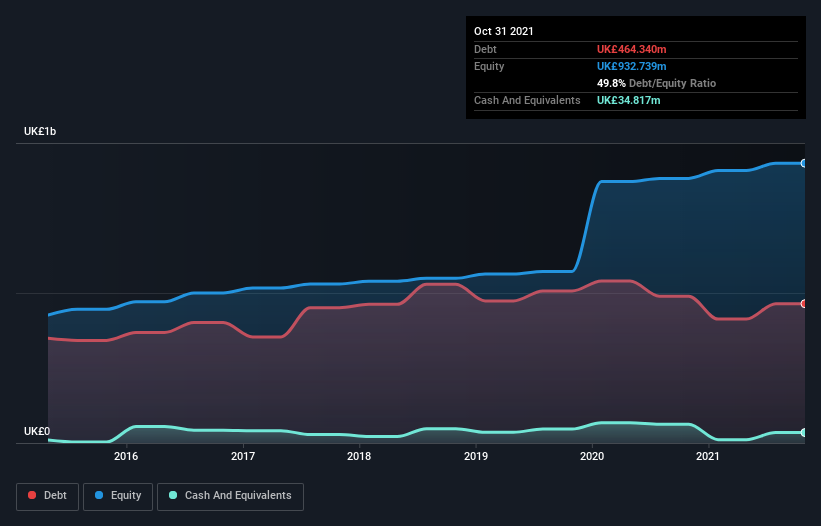Howard Marks put it nicely when he said that, rather than worrying about share price volatility, 'The possibility of permanent loss is the risk I worry about... and every practical investor I know worries about.' When we think about how risky a company is, we always like to look at its use of debt, since debt overload can lead to ruin. We can see that Redde Northgate plc (LON:REDD) does use debt in its business. But is this debt a concern to shareholders?
When Is Debt A Problem?
Generally speaking, debt only becomes a real problem when a company can't easily pay it off, either by raising capital or with its own cash flow. In the worst case scenario, a company can go bankrupt if it cannot pay its creditors. However, a more usual (but still expensive) situation is where a company must dilute shareholders at a cheap share price simply to get debt under control. By replacing dilution, though, debt can be an extremely good tool for businesses that need capital to invest in growth at high rates of return. When we examine debt levels, we first consider both cash and debt levels, together.
See our latest analysis for Redde Northgate
What Is Redde Northgate's Net Debt?
The image below, which you can click on for greater detail, shows that Redde Northgate had debt of UK£464.3m at the end of October 2021, a reduction from UK£489.3m over a year. On the flip side, it has UK£34.8m in cash leading to net debt of about UK£429.5m.

How Healthy Is Redde Northgate's Balance Sheet?
According to the last reported balance sheet, Redde Northgate had liabilities of UK£390.3m due within 12 months, and liabilities of UK£496.1m due beyond 12 months. On the other hand, it had cash of UK£34.8m and UK£335.9m worth of receivables due within a year. So its liabilities total UK£515.6m more than the combination of its cash and short-term receivables.
While this might seem like a lot, it is not so bad since Redde Northgate has a market capitalization of UK£950.8m, and so it could probably strengthen its balance sheet by raising capital if it needed to. However, it is still worthwhile taking a close look at its ability to pay off debt.
In order to size up a company's debt relative to its earnings, we calculate its net debt divided by its earnings before interest, tax, depreciation, and amortization (EBITDA) and its earnings before interest and tax (EBIT) divided by its interest expense (its interest cover). The advantage of this approach is that we take into account both the absolute quantum of debt (with net debt to EBITDA) and the actual interest expenses associated with that debt (with its interest cover ratio).
With net debt sitting at just 1.4 times EBITDA, Redde Northgate is arguably pretty conservatively geared. And this view is supported by the solid interest coverage, with EBIT coming in at 7.4 times the interest expense over the last year. In addition to that, we're happy to report that Redde Northgate has boosted its EBIT by 72%, thus reducing the spectre of future debt repayments. When analysing debt levels, the balance sheet is the obvious place to start. But it is future earnings, more than anything, that will determine Redde Northgate's ability to maintain a healthy balance sheet going forward. So if you want to see what the professionals think, you might find this free report on analyst profit forecasts to be interesting.
Finally, while the tax-man may adore accounting profits, lenders only accept cold hard cash. So the logical step is to look at the proportion of that EBIT that is matched by actual free cash flow. Over the most recent three years, Redde Northgate recorded free cash flow worth 75% of its EBIT, which is around normal, given free cash flow excludes interest and tax. This free cash flow puts the company in a good position to pay down debt, when appropriate.
Our View
Happily, Redde Northgate's impressive EBIT growth rate implies it has the upper hand on its debt. But truth be told we feel its level of total liabilities does undermine this impression a bit. When we consider the range of factors above, it looks like Redde Northgate is pretty sensible with its use of debt. That means they are taking on a bit more risk, in the hope of boosting shareholder returns. There's no doubt that we learn most about debt from the balance sheet. However, not all investment risk resides within the balance sheet - far from it. Case in point: We've spotted 3 warning signs for Redde Northgate you should be aware of, and 2 of them are significant.
If, after all that, you're more interested in a fast growing company with a rock-solid balance sheet, then check out our list of net cash growth stocks without delay.
Valuation is complex, but we're here to simplify it.
Discover if Zigup might be undervalued or overvalued with our detailed analysis, featuring fair value estimates, potential risks, dividends, insider trades, and its financial condition.
Access Free AnalysisHave feedback on this article? Concerned about the content? Get in touch with us directly. Alternatively, email editorial-team (at) simplywallst.com.
This article by Simply Wall St is general in nature. We provide commentary based on historical data and analyst forecasts only using an unbiased methodology and our articles are not intended to be financial advice. It does not constitute a recommendation to buy or sell any stock, and does not take account of your objectives, or your financial situation. We aim to bring you long-term focused analysis driven by fundamental data. Note that our analysis may not factor in the latest price-sensitive company announcements or qualitative material. Simply Wall St has no position in any stocks mentioned.
About LSE:ZIG
Zigup
Engages in the provision of mobility solutions and automotive services to business and personal customers in the United Kingdom, Spain, and Ireland.
Very undervalued average dividend payer.
Market Insights
Community Narratives



